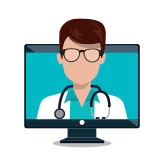What Are the Symptoms of a Respiratory Infection?
A respiratory infection can affect your upper or lower respiratory tract, leading to congestion, breathing difficulties, or a fever. When you have a lower or upper respiratory tract infection, it can involve your sinuses, vocal cords, ears, or lungs. There are several reasons why you can have a respiratory infection such as having influenza, bronchitis, or pneumonia. Lower respiratory infection or upper respiratory infection symptoms can include a swollen throat and lymph glands that make it difficult to swallow. A respiratory infection may include having congestion in the sinuses, a runny nose, sneezing, coughing, and fatigue.
A Physical Examination
At WellCare Urgent Care, a physician will listen to the sounds in your lungs while you are breathing, collect your temperature, and examine your tonsils. During this time you will have your lower or upper respiratory infections diagnosed. The physician can prescribe basic medications such as pain relievers that reduce a fever or sinus tablets that loosen congestion. If your throat is swollen or if you have difficulty talking, then gargling with an antiseptic mouthwash is helpful. In addition, you should drink plenty of liquids to prevent dehydration.
Home Remedies
You can also relieve your respiratory illnesses by using a vaporizer that emits warm moisture into the air, or alternatively, you can use a humidifier that emits cool moisture into the air. It is important to rest as much as possible to help your body heal naturally and staying in a warm environment can make it easier to breathe. There are over-the-counter nasal decongestants that you can use to eliminate the congestion in your sinuses. If your throat hurts, then you can soothe it with throat lozenges.
Should You Take Antibiotics?
When a physician believes that you have a bacterial infection, he can prescribe antibiotics, but this medication is not recommended for most types of respiratory infections. If you have a respiratory infection for more than two weeks, then you should visit an urgent care facility again for additional evaluation to determine if you have a complication that requires treatment.
Preventing Respiratory Infections
It is possible to avoid most respiratory infections by modifying your habits. Avoid associating with other individuals who are ill, and make sure to wash your hands frequently to avoid any contamination. Keep your fingers away from your mouth, nose, or eyes as much as possible. Learn how to cover your mouth with a handkerchief while coughing or sneezing to capture infectious airborne droplets to avoid giving the respiratory infection to others.
Frequently Asked Questions about Respiratory Infections
What are the most common causes of respiratory infections?Who is at a higher risk of a respiratory infection?How long do respiratory infections last?How can I prevent a respiratory infection?Can a respiratory infection cause fatigue? |
Come into WellCare
If you feel that you may be suffering from a respiratory problem then come into WellCare Urgent Care Center in Grand Rapids. We can diagnose the respiratory problem and create the proper treatment plan. We accept walk-ins at our Cascade and Leonard locations – you can also schedule a same-day appointment online.




